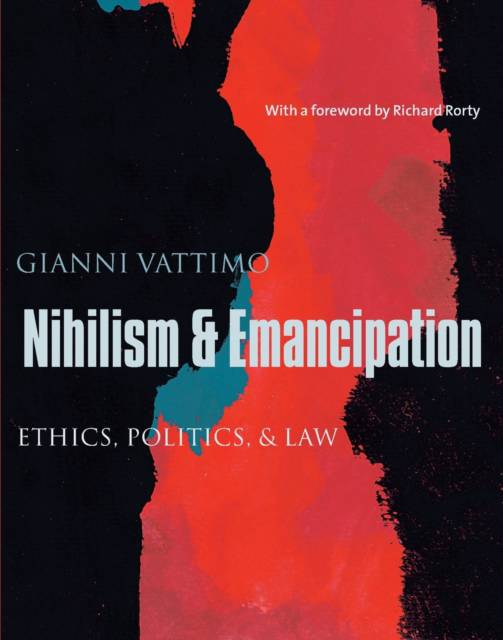
- Afhalen na 1 uur in een winkel met voorraad
- Gratis thuislevering in België vanaf € 30
- Ruim aanbod met 7 miljoen producten
- Afhalen na 1 uur in een winkel met voorraad
- Gratis thuislevering in België vanaf € 30
- Ruim aanbod met 7 miljoen producten
Omschrijving
A daring marriage of philosophical theory and practical politics, this collection is the first of Gianni Vattimo's many books to combine his intellectual pursuits with his public and political life. Vattimo is a paradoxical figure, at once a believing Christian and a vociferous critic of the Catholic Church, an outspoken liberal but not a former communist, and a recognized authority on Nietzsche and Heidegger as well as a prominent public intellectual and member of the European parliament. Building on his unique position as a philosopher and politician, Vattimo takes on some of the most pressing questions of our time: Is it still possible, long after Nietzsche proclaimed the death of God, to talk of moral imperatives, individual rights, or political freedom? Are these values still relevant in today's world?
Tackling these crucial issues, Gianni Vattimo argues that nihilism is not the absence of meaning but a recognition of a plurality of meanings; it is not the end of civilization but the beginning of new social paradigms. Commonly associated with the pessimistic belief that all of existence is meaningless, nihilism, as a philosophical principle, is far less sensational--it is the ethical doctrine that there are no moral absolutes or infallible natural laws, that "truth" is inescapably subjective. Because the conditions for equality and liberty are not "naturally" given, society must actively create these ideals or it will inevitably fall prey to irrationality, prejudice, and oppression. Vattimo contends that the infighting, timidity, and confusion that have overtaken contemporary liberal thought and politics are the products a prolonged and indulgent mourning over the loss of the transcendental father figure--any institution or power structure that defines truth, knowledge, and reality. Until humanity overcomes its need for external authority--whether it be organized religion, the nation-state, or free-market capitalism--emancipation will remain unattainable. Collecting fourteen of Vattimo's most influential essays on ethics, politics, and law, Nihilism and Emancipation is a provocative reevaluation of meaning, values, and the idea of freedom in Western culture.Specificaties
Betrokkenen
- Auteur(s):
- Uitgeverij:
Inhoud
- Aantal bladzijden:
- 160
- Taal:
- Engels
- Reeks:
Eigenschappen
- Productcode (EAN):
- 9780231130837
- Verschijningsdatum:
- 27/02/2007
- Uitvoering:
- Paperback
- Formaat:
- Trade paperback (VS)
- Afmetingen:
- 140 mm x 177 mm
- Gewicht:
- 217 g

Alleen bij Standaard Boekhandel
Beoordelingen
We publiceren alleen reviews die voldoen aan de voorwaarden voor reviews. Bekijk onze voorwaarden voor reviews.











